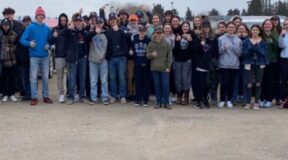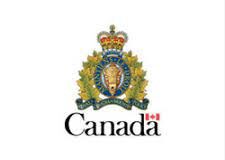Holodomor Observed at Legislature
Michelle Pinon
News Advertiser
On November 25 Fort Saskatchewan-Vegreville MLA Jackie Armstrong-Homeniuk addressed a crowd at the Alberta Legislature who had gathered to remember Holodomor, a horrific crime against humanity and the Ukrainian people which claimed millions of lives.
Ukrainian people have faced many hardships over their history, none worse than the Holodomor – the Communist-planned famine of Ukrainians and others in 1932 and 1933. During this time, millions of men, women, and children were starved to death as a deliberate policy of the Communist State of Joseph Stalin, stated Armstrong-Homeniuk.
She went on to say, “This was a genocide, an unspeakable tragedy that we manage to find words to describe each and every year – in order to ensure the world never forgets. But as Ukrainian people, we often speak about this sad history with more than just our words,” stated Armstrong-Homeniuk.
“My Ukrainian identity is integral to who I am as a mother, as a citizen, as a businessperson, and as a legislator. As some of you may know, I am a descendant of Ivan Pylypow, the first Ukrainian immigrant to Canada.
Ivan Pylypow’s story was not unlike so many other Ukrainians who migrated to our free and promising lands. Ivan Pylypow came to Canada in the first of three large waves of Ukrainian migration between the late-1800s – and the early to mid-1900s. Ukrainian people have often had to travel great distances to escape hardship and find better lives.
But as Ukrainian people, we often speak about this sad history with more than just our words. For instance, as a girl, I remember sitting on the lap of my Baba Anny-Huley, she always wore an apron.
One time in particular I noticed that apron was rather lumpy. I would ask her: “What’s in your apron?” “Potatoes”, she would say. My Baba would carry a few potatoes in her apron at all times. “You never know when you might need them”, she would say. I remember this about my Baba fondly – but I look back on this now and reflect on the great sadness behind it.
During the Holodomor, Stalin’s regime sealed off much of central and eastern Ukraine from any incoming food. All grain and agricultural products were confiscated from farmers because those farmers refused to participate in communist collectivization of their lands.
So, while we as Ukrainians love food, we also value and cherish food because of this dark chapter in our history. The Holodomor was a terrible evil. Here in Alberta, we recognize the Holodomor as a Genocide – with the fourth Saturday of November serving as a day of remembrance for victims.
As a proud Ukrainian, I am honoured to be here with you today – remembering the victims of the Holodomor. This is a dark chapter in human history that we recognize and remember, so that we never have to re-live.
On behalf of Premier Jason Kenney and the entire Government of Alberta, I wish to offer my prayers to all the victims and their families. Memory eternal. May a terrible evil like this never happen again.”
Armstrong-Homeniuk, is the Chair of ACAUR, the Advisory Council on Alberta Ukraine Relations, and is also the Chair of the Alberta Skilled Trades Caucus.
According to information published on the Ukrainian Canadian Congress, (UCC) website, “The UCC believes it is vital to ensure that this tragedy is not forgotten as it is the best hope against history repeating itself…
By sheer magnitude, losses during the Holodomor surpassed those of the Ukrainian nation during the Second World War. Ukrainians worldwide continue to suffer the consequences of this merciless act.
With the de-classification of documents in Ukraine and eyewitness accounts, the world has learned of a horrific crime against humanity about which little was previously known or officially confirmed. The confirmation was made by Ukraine itself in its quest for historical truth and national identity. It is fact that the Holodomor: a) occurred; b) was deliberate; and was c) designed to destroy a nation.
Following Ukraine’s lead, supported by the wealth of information available, the international community joined in recognizing the Holodomor. To date, fourteen countries have formally recognized the Holodomor as an act of genocide: Australia, Canada, Colombia, Ecuador, Estonia, Georgia, Hungary, Latvia, Lithuania, Mexico, Paraguay, Peru, Poland, and the Vatican.
The Government of Canada recognized the Holodomor in May 2008 with an Act declaring the famine an act of genocide and establishing a national Ukrainian Famine and Genocide (Holodomor) Memorial Day. Similar legislation has been passed by the provinces of Saskatchewan, Manitoba, Alberta, Ontario and Quebec.
The UCC continues to work toward recognition of the Holodomor as genocide in all Canadian provinces and supports the international campaign for recognition by the United Nations.”






